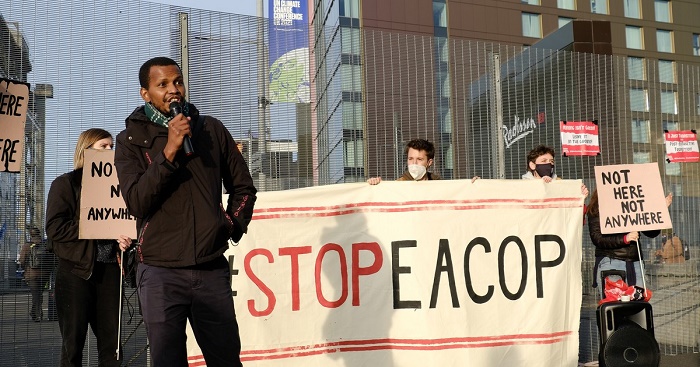Members of Oilwatch Africa, who paid a courtesy visit to the Africa Institute for Energy Governance (AFIEGO) and other civil society organisations (CSOs) working to protect the environment and communities’ land and human rights within the oil and gas regions from September 6 to 8, 2022, have called on Total and all her financiers to halt the devastating extraction projects in Uganda.

Some of these projects include Tilenga, Kingfisher, the oil refinery, and East African Crude Oil Pipeline (EACOP), which they believe will negatively impact on the biodiversity.
Failure to stop the projects, says Oilwatch, will add to the increasing dossier of environmental and human rights crimes by Total and financial enablers.
The group implored the people and Government of Uganda “not to fall for the lies by Total and other fossil fuels purveyors of promises of economic development, jobs, and energy access for communities.”
Oilwatch adds: “Experience from producing countries and their communities show devastating levels of pollution, displacement, increased national debt, and poverty levels of unimaginable proportions.
“We stand in solidarity with the people of Hoima, Bulisa, and other communities as they fight to protect their livelihoods and survival in the face of ferocious attacks by Total and the fossil fuel industry.
“We call for the protection of all community defenders and activists from harassment, arrests, and threats.”
The main objective of the solidarity visit, says Oilwatch, was to show our support to AFIEGO and partners in Uganda.
Oilwatch recalls details of the visit thus:
We note that, for over 12 years, AFIEGO has been promoting and supporting communities from the oil and gas regions to protect their environment, land and human rights against oil and gas and other related projects. We also note that since the commercialisation of Uganda’s oil, the project-affected communities have experienced several challenges including delayed and unfair compensation, displacement from their land, increased human rights abuses and others that have negatively affected their livelihoods.
Projects such as Tilenga, Kingfisher, the oil refinery, East African Crude Oil Pipeline (EACOP) and others will negatively impact on critical biodiversity that are of international importance and are under UNESCO’s world heritage and RAMSAR sites such as national parks, forests, lakes, rivers and among others. These oil and gas projects are also contrary to the country’s commitments as obliged under the Paris Agreement, Kyoto Protocol, United Nations Framework Convention on Climate Change (UNFCCC) that aim at reducing greenhouse gas emissions.
We note that oil and gas resources are not renewable, and their exploration and exploitation leave irreparable scars on both people and planet. Moreover, the resources in Uganda will only last a couple of decades if exploited but will leave damages that will have intergenerational impacts.
During our visit, we shared experiences from our respective countries and how communities and CSOs can oppose oil and gas activities that undermine human and environmental rights as well as climate change. We saw and heard of the shattered dreams of ordinary people displaced by the oil projects. The separation of families, the disruption of normal family lives caused by displacement. Young dreams of getting education were shattered after interruptions of up to five years without schools, whilst waiting for resettlement.
We heard about and saw the pain of families separated from sacred spiritual sites and the desecration of graves of their departed loved ones. Replacement houses that have been constructed in complete disregard of the way of life of the affected families. Family compounds of individual houses situated and constructed with reverence to family traditions and customs were replaced with single houses with shared bedrooms.
We heard how compensation was calculated to discount and ignore sources of livelihood like fruit trees, crops, and other lifesaving biodiversity resources. We heard of threats, harassment and, arrests of community defenders and other activists putting down their lives to defend the rights and dignity of their communities.
We engaged stakeholders including civil society, government human rights institutions and, nongovernmental organisations concerned about human rights and situation of environmental defenders, and impressed on them that environmental rights are human rights, and the safety and security of defenders is paramount.
We encourage AFIEGO, oil-affected communities, and other CSOs to continue undertaking efforts in promoting environmental conservation, protection of human rights and climate change mitigation in Uganda to remain resolute in defending our environment and by extension preserve our socio-ecological values and resilience to the ravages of mindless neoliberal exploitation.
